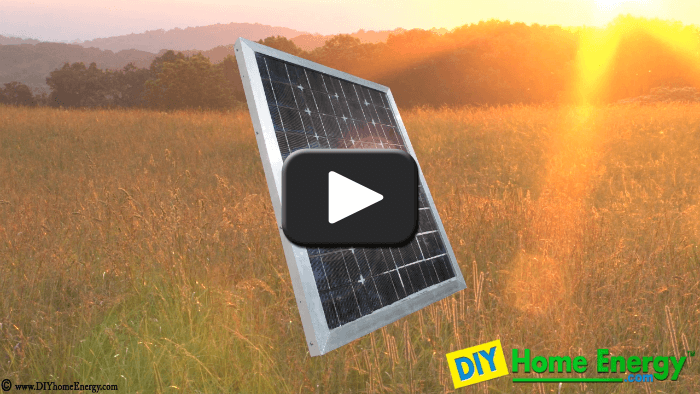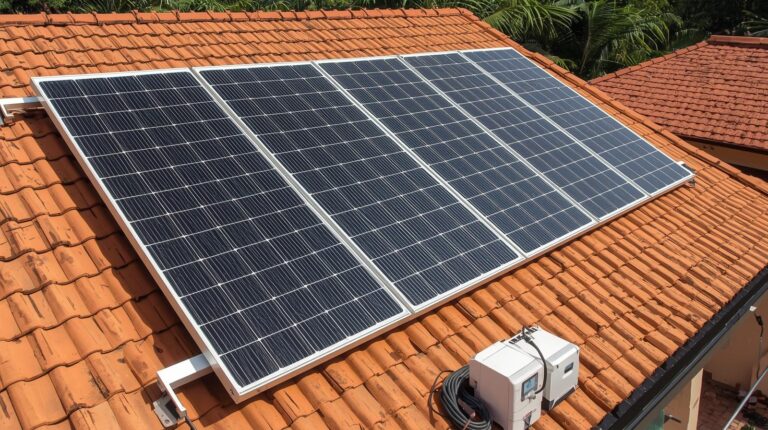Are you interested in harnessing the power of the sun to create an off-grid solar system for your home? Look no further! Here are the 10 best policies for residential off-grid solar systems that will help you achieve energy independence and reduce costs.
Imagine having an energy-efficient home design, with a south-facing roof perfect for solar panel installation. You’ll also want backup batteries for energy storage and efficient appliances to minimize energy usage. Don’t forget additional solar equipment and proper installation and maintenance.
Assess your energy consumption and budget before selecting a system, and choose a kit with high-quality components and warranties. Consider the location and sun exposure for optimal system size, and transition to more efficient appliances for energy conservation.
Join the growing community of homeowners embracing solar power!
Permitting Requirements for Residential Off-Grid Solar
Before you install a residential off-grid solar system, it’s crucial to understand the permitting requirements in your local area. These requirements may vary depending on where you live, and they typically involve zoning, building codes, electrical codes, and environmental regulations.
In some locations, you may need to obtain permits for the installation of solar panels, battery storage systems, and other components necessary for off-grid living. Adhering to these permits ensures that your off-grid solar system is installed safely and complies with local regulations, reducing the risk of legal issues or safety hazards.
To avoid fines or legal complications, it’s essential to research and comply with the specific permitting requirements in your area before going off the grid. Engaging with local authorities or seeking assistance from professionals familiar with off-grid solar permitting can help you navigate the process and ensure compliance with all necessary regulations.
Interconnection Standards for Off-Grid Solar Systems
To ensure the safe and efficient operation of your off-grid solar system, it’s important to understand the interconnection standards that govern its installation and use.
Interconnection standards refer to the guidelines and regulations that dictate how your solar energy system should be connected to other components such as the battery bank, solar array, and solar charge controllers. These standards are designed to ensure that your system operates smoothly and safely, while also minimizing any potential disruptions to the electrical grid.
Compliance with interconnection standards is essential for obtaining permits and approvals for your off-grid solar system. It’s recommended to consult an energy specialist who can guide you through the specific interconnection standards relevant to your location and equipment.
Additionally, if you’re considering using a Tesla Powerwall or other deep cycle batteries, it’s crucial to adhere to the manufacturer’s guidelines and any applicable interconnection standards.
Net Metering Policies for Residential Off-Grid Solar
If you’re considering installing a residential off-grid solar system, understanding the net metering policies in your area is crucial. Net metering allows you to sell any excess energy generated by your off-grid solar system back to the grid, providing you with cost savings and even a source of income.
Here are three important things to know about net metering policies for residential off-grid solar systems:
- Financial incentives: Some regions offer financial incentives or credits for surplus energy generated by off-grid solar systems. These incentives can help offset the initial cost of installing the system and provide ongoing financial benefits.
- Grid connectivity: Net metering policies allow your off-grid solar system to remain connected to the grid. This means that during periods of low solar power generation or high energy needs, you can draw power from the grid to supplement your system’s energy production.
- Energy storage: Net metering policies often require residential off-grid solar systems to have energy storage capabilities. This ensures that any excess energy generated during peak production periods can be stored for later use when the weather conditions are less favorable for solar power generation.
Understanding the net metering policies specific to your area will help you make informed decisions about your off-grid solar system and maximize its benefits for your home.
Incentives and Rebates for Off-Grid Solar Installations
Understanding the financial benefits of incentives and rebates is essential when considering residential off-grid solar installations. Installing solar off-grid systems can provide numerous advantages in terms of energy production, renewable energy utilization, and reduced energy consumption.
To further incentivize homeowners to embrace off-grid solar, various government programs and utility companies offer incentives and rebates. These financial incentives can significantly offset the upfront costs of installing a residential off-grid solar system, making it a more affordable option for homeowners. Incentives and rebates can come in the form of tax credits, cash rebates, grants, or low-interest loans.
These programs not only encourage the adoption of renewable energy but also promote energy independence and sustainability. By taking advantage of these incentives and rebates, homeowners can enjoy the financial benefits of off-grid solar while contributing to a cleaner and more sustainable future.
Safety Regulations for Residential Off-Grid Solar Systems
When considering the installation of a residential off-grid solar system, it’s important to be aware of the safety regulations that must be followed. Here are three key safety regulations to keep in mind:
- Proper installation: It’s crucial to ensure that the solar panels and battery systems are installed correctly to prevent any accidents or damage. This includes following the manufacturer’s guidelines and using appropriate mounting hardware to secure the panels in place.
- Battery safety: Off-grid homes rely heavily on battery systems for energy generation and storage. It’s essential to choose high-quality solar batteries that have the appropriate storage capacity and are designed to withstand the demands of off-grid living. Regular maintenance and monitoring of the battery system is also crucial to ensure optimal performance and prevent any safety issues.
- Electrical safety: Off-grid systems require a deep understanding of electrical systems and power sources. It’s important to use heavy gauge wires to reduce resistance and voltage drop, and to avoid high currents above 100 Amps to prevent accidents and property damage. Regular inspections and maintenance of the wiring and electrical components are also necessary to ensure safety and energy efficiency.
Environmental Impact Regulations for Off-Grid Solar Power
When it comes to off-grid solar power, environmental sustainability standards play a crucial role. These standards ensure that off-grid solar systems are designed, installed, and operated in a manner that minimizes their environmental impact. Compliance with these standards involves implementing measures to prevent pollution, promote energy efficiency, and minimize the use of natural resources.
Additionally, it’s important to consider the potential impact of off-grid solar systems on local ecosystems and take steps to mitigate any negative effects.
Environmental Sustainability Standards
To ensure environmental sustainability in off-grid solar power systems, you should adhere to strict environmental impact regulations. By following these standards, you can contribute to reducing your carbon footprint and promoting a cleaner and greener future.
Here are three key considerations for achieving environmental sustainability in off-grid solar systems:
- Reduce battery usage: Opt for energy-efficient appliances and devices, as they can reduce the load on your batteries and extend their lifespan. This will minimize the need for frequent battery replacements, which can have a significant environmental impact.
- Avoid lead-acid batteries: Lead-acid batteries are commonly used in off-grid solar systems, but they have several environmental drawbacks. Consider using alternative battery technologies, such as lithium-ion or nickel-metal hydride, which are more environmentally friendly.
- Optimize solar energy use: Maximize the utilization of solar energy by investing in a high-quality solar charger and ensuring optimal placement and maintenance of your solar panels. This will help you make the most of available sunlight and reduce reliance on other energy sources, further enhancing the sustainability of your off-grid system.
Off-Grid Solar Compliance
To ensure compliance with environmental impact regulations, implement the best practices for off-grid solar power systems in your residential setup.
Going off-grid with solar power allows you to take control of your energy generation and reduce your carbon footprint. However, it’s important to consider the pros and cons of off-grid solar systems and ensure that you’re meeting all necessary regulations.
One key component of off-grid systems is deep-cycle batteries, which store the energy generated by the solar panels for later use. These batteries must be properly maintained and disposed of to minimize environmental impact.
Additionally, if you’re considering a DIY solar installation, make sure to research and follow all relevant regulations and guidelines to ensure compliance with environmental impact regulations.
Impact on Local Ecosystems
Maintaining the health of local ecosystems is crucial when implementing off-grid solar systems in residential areas. Off-grid solar systems have the potential to make a positive impact on the environment, but it’s essential to consider their potential effects on the local ecosystems. Here are three important factors to consider:
- Off-grid solar systems come in various types, including common solar panels and high-energy batteries. When choosing a system, it’s important to assess its environmental impact and ensure that it aligns with local ecosystem conservation goals.
- Battery storage is a key component of off-grid solar systems. Lithium batteries are commonly used because of their high energy density and efficiency. However, it’s crucial to properly manage and dispose of these batteries to prevent any harm to the local ecosystem.
- Extreme weather events can pose a challenge for off-grid solar systems. Proper design and installation are necessary to ensure that the system can withstand these conditions and minimize any potential damage to the local ecosystem.
Building Codes and Zoning Regulations for Off-Grid Solar Systems
You must comply with the local building codes and zoning regulations when installing your residential off-grid solar system. These regulations ensure the safety, efficiency, and proper installation of your system.
Building codes may dictate the type of solar panels you can use, the placement of the panels on your property, and the electrical wiring requirements.
Zoning regulations may also impact the installation process by specifying setbacks, height restrictions, and aesthetic considerations.
It’s important to consult with local authorities or a professional installer to understand the specific requirements in your area.
By using a modern off-grid solar system, you have a wide range of options to choose from.
Many off-grid solar companies offer several power options, allowing you to select the best solar system that meets your needs while complying with building codes and zoning regulations.
Tax Policies and Exemptions for Residential Off-Grid Solar
When installing your residential off-grid solar system, it’s important to be aware of the tax policies and exemptions that can help reduce your upfront costs and save you money in the long run. Here are three tax policies and exemptions to consider:
- Tax Credits: Many countries and states offer tax credits for installing off-grid solar systems. These credits can amount to thousands of dollars off your initial investment, making it more affordable to power your cabin, home, or business with solar panels.
- Property Tax Exemptions: Some areas provide exemptions for the increased property value that comes with installing a solar system. This can save you money on your property taxes, further reducing the overall cost of your off-grid solar installation.
- Sales Tax Exemptions: Certain states exempt off-grid solar equipment purchases from sales tax. This exemption can help lower the cost of your DIY off-grid solar project, allowing you to save even more money.
Insurance Requirements for Off-Grid Solar Installations
To ensure comprehensive coverage for your off-grid solar system, it’s important to be aware of the insurance requirements. Insurance should cover not only the solar panels themselves but also the batteries and other equipment that make up your system. This coverage protects you against potential damage or theft.
Liability coverage is also crucial, as it safeguards you from accidents or injuries that may occur due to your off-grid solar system. Additionally, consider coverage for potential power outages and loss of income during downtime.
It’s essential to consult with insurance providers experienced in off-grid solar to tailor your coverage to the specific components and potential risks of your system. Don’t forget to include coverage for natural disasters and extreme weather events that could impact your system’s performance.
With the right insurance, you can have peace of mind and maintain control of your energy even when the sun isn’t shining.
Grid Backup and Emergency Power Regulations for Off-Grid Solar Systems
Ensure compliance with grid backup and emergency power regulations for your off-grid solar system by understanding the specific requirements and guidelines. Here are three key considerations to keep in mind:
- Battery Capacity: To meet emergency power regulations, your off-grid solar system should have sufficient battery capacity to provide backup power during outages. Calculate the amount of energy required to power essential appliances and devices, and ensure your batteries can store enough energy to meet those needs.
- Inverter Capacity: The inverter is an essential component of your off-grid solar system. It converts the DC power your solar panels generate and store in your batteries into AC power that you can use in your home. Make sure your inverter has the capacity to handle the load of your essential appliances during emergency situations.
- Automatic Transfer Switch: An automatic transfer switch is necessary to seamlessly switch between the grid and your off-grid system during power outages. This ensures a smooth transition from grid power to your backup power source and vice versa. Check local regulations and make sure to equip your system with a reliable automatic transfer switch.
Conclusion
Congratulations on taking the necessary steps to create an efficient and sustainable off-grid solar system for your home! By implementing these 10 best policies, you haven’t only achieved energy independence and cost savings but also contributed to a greener future.
Remember, ‘The sun never says to the Earth, ‘You owe me.’ Look what happens with a love like that. It lights up the whole sky.’ Keep harnessing the power of the sun and continue making a positive impact on our environment.





